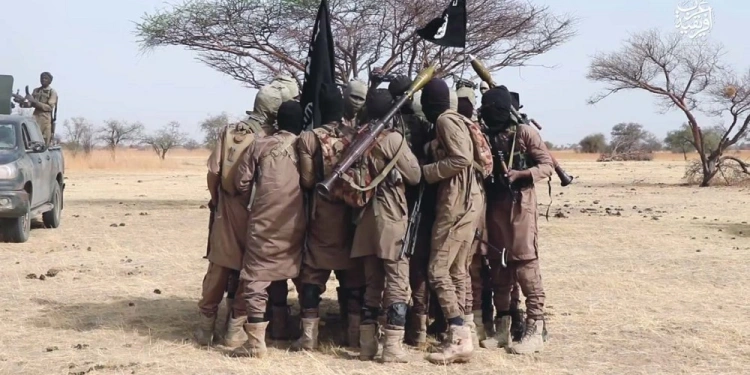In a tragic incident that has shocked the community, three students from Faudiya School in Geidam Local Government Area, Yobe State, were killed by gunmen suspected to be Boko Haram insurgents.
The attack, which took place at around 3 a.m. on Friday, targeted the school operated by the Islamic Movement in Nigeria (IMN).
This violent act has raised serious concerns about the ongoing security challenges in the region and the safety of educational institutions.

According to eyewitness accounts, the gunmen stormed the school premises under the cover of darkness, catching the students off guard as they slept.
The attackers dragged the students outside before shooting them, leaving three dead and another injured.
The brutality of the assault has left the community in mourning and has heightened fears among parents and students alike.
The Yobe State Police Public Relations Officer, DSP Dungus Abdulkarim, confirmed the incident, stating that three students were killed and one was injured in the attack. “Yes, the report is confirmed.
Three of them (students) were killed while one was injured,” DSP Abdulkarim told Newsmen, highlighting the severity of the situation.
The attack on Faudiya School is not an isolated incident but part of a broader pattern of violence in the region attributed to Boko Haram, a terrorist group that has been waging an insurgency in northeastern Nigeria for over a decade.
The group, whose name loosely translates to “Western education is forbidden,” has frequently targeted schools, abducting and killing students and teachers in a bid to disrupt educational activities and spread fear.
This attack underscores the persistent threat posed by Boko Haram, despite ongoing efforts by security forces to combat the insurgency.
The targeting of schools by Boko Haram is particularly devastating as it aims to undermine the education system, which is a vital tool for the socio-economic development of the region.
By attacking educational institutions, the group seeks to impose its extremist ideology and prevent young people from receiving the education that could empower them to contribute positively to their communities and the nation at large.
The Islamic Movement in Nigeria (IMN), which operates Faudiya School, is itself a group that has faced various challenges, including clashes with government forces in the past.
While the IMN is not directly affiliated with Boko Haram, the attack on its school reflects the broader security vulnerabilities faced by many organisations and communities in northern Nigeria.
This latest incident has prompted calls for enhanced security measures to protect schools and ensure the safety of students and staff.
Community leaders and security experts have urged the government to bolster its efforts to safeguard educational institutions, especially in areas prone to insurgent attacks.
There are also calls for improved intelligence gathering and community engagement to preempt such attacks and prevent further loss of life.
In response to the attack, local authorities are coordinating with security agencies to investigate the incident and apprehend the perpetrators.
However, the road to justice and security remains fraught with challenges, as Boko Haram continues to adapt its tactics, exploiting vulnerabilities in the region’s security architecture.
The Federal Government, alongside state and local authorities, has been urged to prioritise the protection of schools as part of a broader strategy to combat terrorism and restore normalcy to affected areas.
This includes not only deploying security personnel to vulnerable locations but also investing in community-based approaches to build resilience against extremist ideologies.
In the wake of the attack, there is a renewed call for solidarity and support for the victims’ families.
Community members are coming together to mourn the loss of the students and to offer assistance to the injured survivor.
The tragedy has also reignited discussions about the importance of education and the need to protect it from those who seek to destroy it.
As Yobe State and the wider northeastern region grapple with the aftermath of this attack, the resolve to protect the right to education remains strong.
The community’s resilience in the face of such adversity is a testament to the enduring human spirit, even as they call for more decisive action to bring an end to the violence that has plagued the region for far too long.
This incident serves as a stark reminder of the ongoing challenges in Nigeria’s fight against terrorism.
It underscores the urgent need for a comprehensive approach that not only addresses the immediate security concerns but also tackles the root causes of extremism, ensuring a safer future for the nation’s children and its educational institutions.
Support InfoStride News' Credible Journalism: Only credible journalism can guarantee a fair, accountable and transparent society, including democracy and government. It involves a lot of efforts and money. We need your support. Click here to Donate
